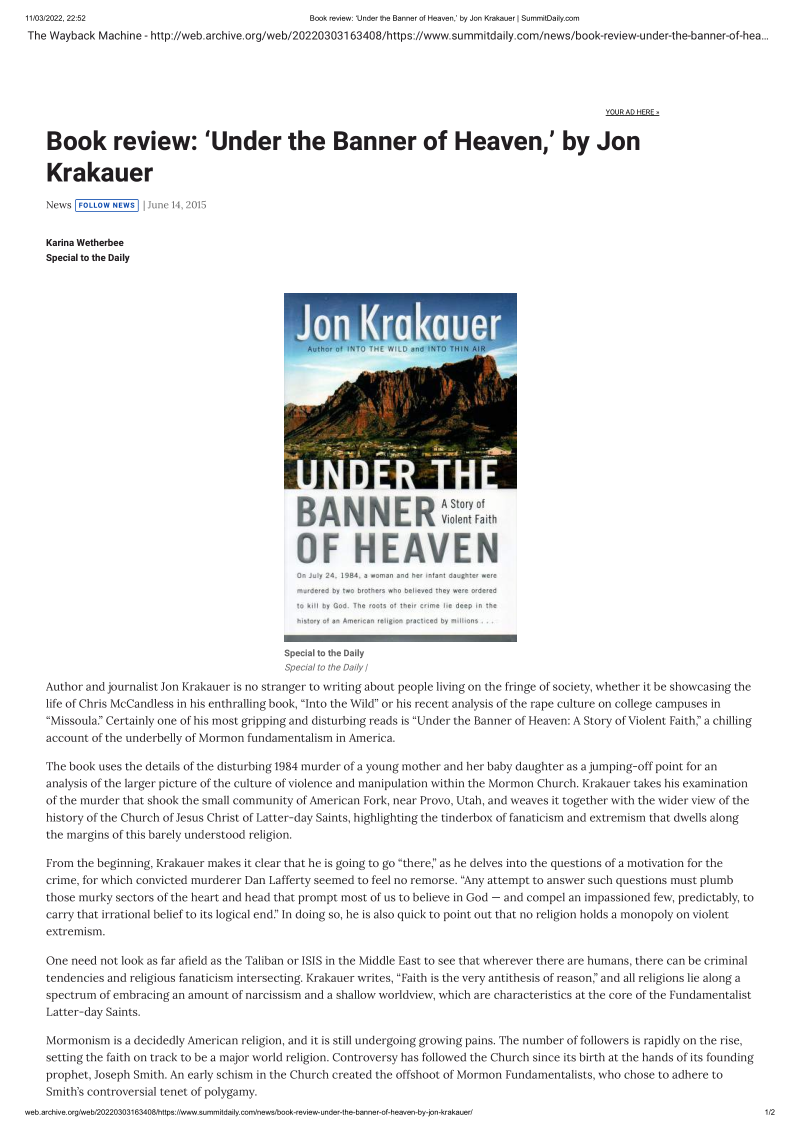Karina Wetherbee praises Krakauer's writing style and storytelling.
- Type
- News (traditional)
- Source
- Karina Wetherbee Non-LDS
- Hearsay
- DirectJournalism
- Reference
Karina Wetherbee, "Book review: ‘Under the Banner of Heaven,’ by Jon Krakauer," Summit Daily, June 13, 2015
- Scribe/Publisher
- Summit Daily
- People
- Karina Wetherbee
- Audience
- Reading Public
- Transcription
Author and journalist Jon Krakauer is no stranger to writing about people living on the fringe of society, whether it be showcasing the life of Chris McCandless in his enthralling book, “Into the Wild” or his recent analysis of the rape culture on college campuses in “Missoula.” Certainly one of his most gripping and disturbing reads is “Under the Banner of Heaven: A Story of Violent Faith,” a chilling account of the underbelly of Mormon fundamentalism in America.
The book uses the details of the disturbing 1984 murder of a young mother and her baby daughter as a jumping-off point for an analysis of the larger picture of the culture of violence and manipulation within the Mormon Church. Krakauer takes his examination of the murder that shook the small community of American Fork, near Provo, Utah, and weaves it together with the wider view of the history of the Church of Jesus Christ of Latter-day Saints, highlighting the tinderbox of fanaticism and extremism that dwells along the margins of this barely understood religion.
From the beginning, Krakauer makes it clear that he is going to go “there,” as he delves into the questions of a motivation for the crime, for which convicted murderer Dan Lafferty seemed to feel no remorse. “Any attempt to answer such questions must plumb those murky sectors of the heart and head that prompt most of us to believe in God — and compel an impassioned few, predictably, to carry that irrational belief to its logical end.” In doing so, he is also quick to point out that no religion holds a monopoly on violent extremism.
One need not look as far afield as the Taliban or ISIS in the Middle East to see that wherever there are humans, there can be criminal tendencies and religious fanaticism intersecting. Krakauer writes, “Faith is the very antithesis of reason,” and all religions lie along a spectrum of embracing an amount of narcissism and a shallow worldview, which are characteristics at the core of the Fundamentalist Latter-day Saints.
Mormonism is a decidedly American religion, and it is still undergoing growing pains. The number of followers is rapidly on the rise, setting the faith on track to be a major world religion. Controversy has followed the Church since its birth at the hands of its founding prophet, Joseph Smith. An early schism in the Church created the offshoot of Mormon Fundamentalists, who chose to adhere to Smith’s controversial tenet of polygamy.
The modern practice of plural marriage is at the heart of the brutal murders of young FDLS mother Brenda and her daughter, Erica. Krakauer explores the historical progression of the practice, and he examines the mysterious modern-day enclaves where men still take several wives as a cornerstone of their faith.
As with many religions, believers pick and choose which aspects of their teachings they will hold to and fight for, and the FLDS has made itself a pariah in a world that has moved on with social conventions and expectations and, more significantly, with rights for women, which most see the practice of polygamy as inhibiting. With pressures on the Church during the latter part of the 19th century, the LDS turned away from polygamy, albeit reluctantly, pushing a segment of the believers into secret marriages and to the fringes of their faith. Mainstream Mormons saved face in the eyes of the American public by rejecting — or seeming to — polygamy.
The Mormon Fundamentalists, as a result, felt this was a significant error and a rejection of one of the primary tenets of the faith. Many of these fundamentalists view themselves as the true Mormons and that the modern LDS members are traitors to the faith. As Krakauer probes more deeply into the world of the Mormon Fundamentalists, he uncovers a darkness that cloaks a disturbing reality — a reality that it is shocking to discover exists in 21st century America.
Some men in the isolated community of Colorado City, Arizona, see nothing wrong with having sex with their own daughters, whom they see as simply another batch of wives. Many of the young girls do not speak out against their abusers because they have been raised to submit and to fear retribution, either by their insular community or in the afterlife.
Readers of Krakauer’s book will see similarities with horror stories of the Taliban’s enforcement of Sharia Law against the citizens of Afghanistan, and just as Malala Yousafzai was denied an education in Pakistan, the young girls of the FLDS are forced to halt their schooling after sixth grade, for any truly inflexible community knows that it is easier to control someone’s mind if their education is strictly curtailed. Women who think for themselves undermine the control the men hold over them.
The deeper the examination of the FLDS goes, the more gripping the book becomes. Krakauer uses his unrivaled writing chops and his knack for finding gems of information through the breadth of his research to build a fascinating overview of the secretive world of the Fundamentalists of the Mormon Church. Respectful, but hard-hitting in his reporting, Krakauer hits another one out of the park with “Under the Banner of Heaven.”
- Citations in Mormonr Qnas
The B. H. Roberts Foundation is not owned by, operated by, or affiliated with the Church of Jesus Christ of Latter-day Saints.

